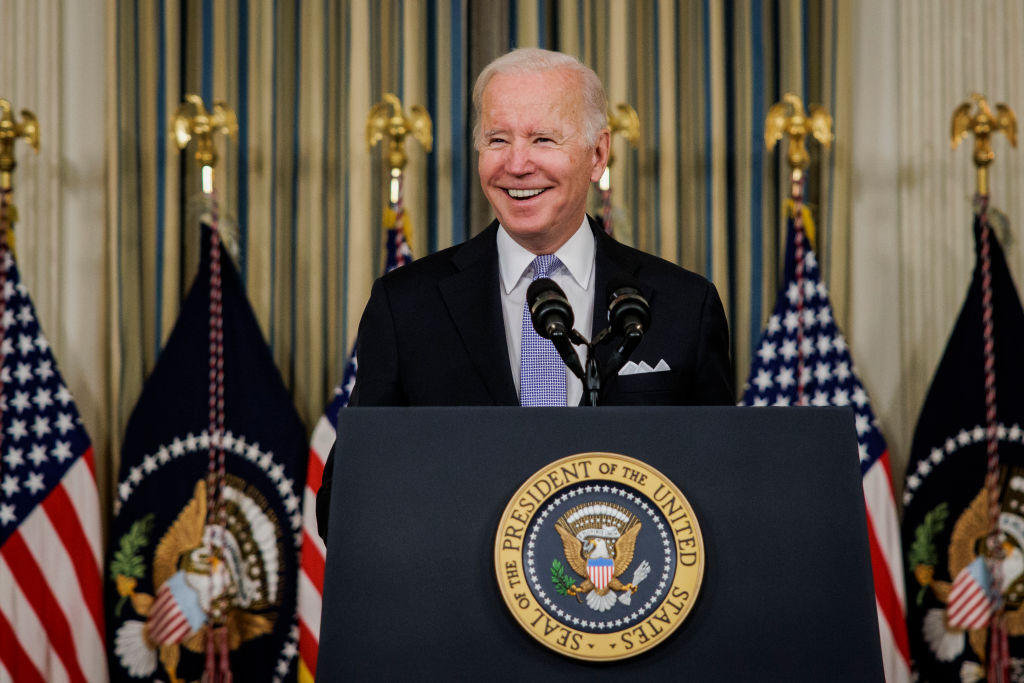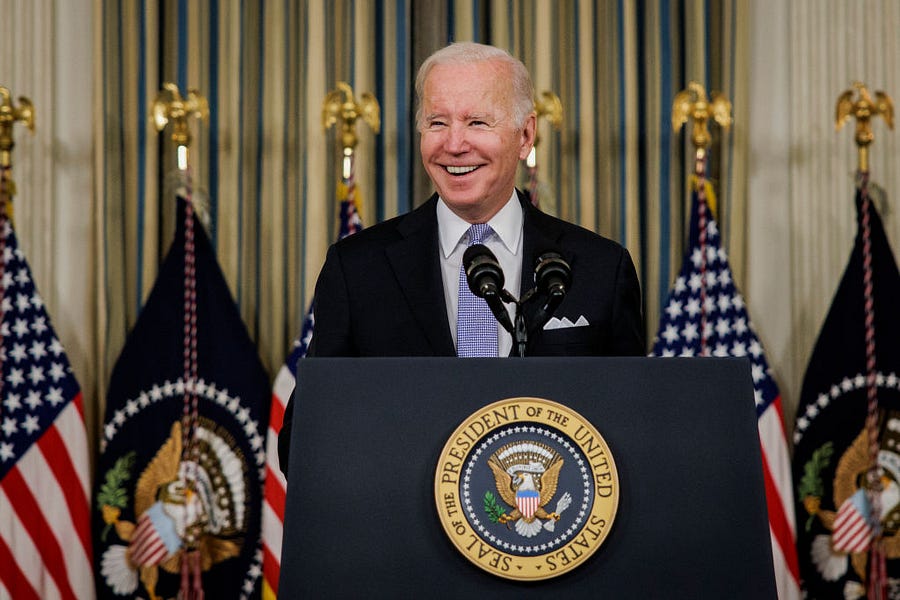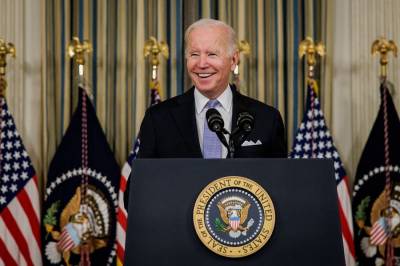Happy Monday! We were barely able to finish today’s newsletter in time because we devoted our entire weekend to getting really, really mad at an anthropomorphic bird.
Quick Hits: Today’s Top Stories
The House of Representatives ended a months-long standoff Friday night and voted 228-206 to pass the bipartisan infrastructure package approved by the Senate in August. Thirteen Republicans crossed party lines to support the $1 trillion bill that includes about $550 billion in new spending, while six progressive Democrats voted against it.
The Bureau of Labor Statistics reported Friday that U.S. employers added 531,000 jobs in October, beating the Dow Jones expectation of 450,000 and dropping the unemployment rate to 4.6 percent.
Pfizer’s oral COVID-19 antiviral, PAXLOVID, was found to reduce the risk of hospitalization or death by 89 percent when taken shortly after a COVID diagnosis, according to data from a randomized Phase II/III trial of high-risk patients released on Friday. Just 0.8 percent of those receiving PAXLOVID within three days of COVID symptom onset were hospitalized, compared to 7 percent of those who received a placebo.
An armed drone attacked Iraqi Prime Minister Mustafa al-Kadhimi’s residence early Sunday morning, with the leader surviving what what Iraqi officials described as an assassination attempt. No group has claimed responsibility for the ambush, but it came just days after skirmishes in Baghdad between government forces and Iranian-backed political parties disputing the outcome of October’s general election.
A federal appeals court temporarily stayed the Biden administration’s vaccine mandate for large companies over the weekend after several Republican state governments and business/advocacy groups sued to block its implementation. The Department of Labor has until 5 p.m. today to respond to the mandate opponents’ request for an injunction, at which time the appeals court will make a decision that could then be appealed to the Supreme Court. The Occupational Safety and Health Administration (OSHA) mandate does not go fully into effect until January 4, 2022.
Anti-coup demonstrations continued in Sudan over the weekend, with hundreds of protesters gathering in the capital of Khartoum on Sunday, where they were tear-gassed and arrested en masse by Sudanese security forces.
Eight people died and several others were injured at Travis Scott’s Astroworld music festival in Houston on Friday after the raucous, 50,000-person crowd swelled toward the stage. At least 11 of the 17 people taken to the hospital were in cardiac arrest and required CPR, according to Houston Fire Chief Samuel Peña, and the dead ranged from ages 14 to 27.
Joe Biden’s Make-or-Break Friday

On October 28, President Biden traversed Pennsylvania Avenue to deliver an urgent message to congressional Democrats in person: “I don’t think it’s hyperbole to say that the House and Senate majorities and my presidency will be determined by what happens in the next week.”
One day later, the Commerce Department released data showing that, by one measure, year-over-year inflation had reached a three-decade high. The following Tuesday, voters swung dramatically rightward in several high-profile elections that were widely interpreted as a rebuke of the president and his party. As the week drew to a close, Biden’s approval rating—dragged down by a chaotic withdrawal from Afghanistan, ongoing supply chain disruptions leading to rising food and energy prices, and the pandemic’s Delta wave keeping some COVID-19 restrictions in place—fell to the lowest level of his term. Dating back to the 1940s, only Donald Trump and Gerald Ford were less popular at this point in their presidencies.
Needless to say, Biden began Friday in desperate need of a win. He got two.
Jobs Numbers Rebound
The first came early in the day, with the Bureau of Labor Statistics announcing at 8:30 a.m. ET that U.S. employers added 531,000 jobs in October, leading the unemployment rate to drop from 4.8 percent to 4.6. After two consecutive jobs day misses in a row—235,000 actual vs. 720,000 expected in August, 194,000 v. 500,000 in September—the economy beating Dow Jones’ 450,000 October consensus was welcome news.
Biden took a victory lap. “In total, the job creation in the first full nine months of my administration is about 5.6 million new jobs—a record for any new president,” he said in remarks at the White House. “Unemployment has decreased this year by more than any other year since 1950.”
“This did not happen by accident or just because,” he continued, referencing March’s American Rescue Plan and his administration’s vaccination efforts. “We still have to tackle the costs that American families are facing. But this recovery is faster, stronger, and fairer, and wider than almost anyone could have predicted. That’s what the numbers say.”
As we’ve noted repeatedly in recent months, those higher costs—inflation—are of increasing concern to economists across the political spectrum. But October’s jobs report—which also included a combined upward revision of 235,000 jobs for August and September—helped dampen fears of something even worse: stagflation.
“Stagnant economies don’t add 531,000 jobs in a month, and they don’t exhibit a low and rapidly falling unemployment rate,” New York Times senior economic correspondent Neil Irwin wrote Friday.
The economy is not completely back to pre-pandemic levels; the labor force participation rate has plateaued at about 61.5 percent (down from 63.3 pre-pandemic), and about 4.2 million fewer people are working today than in February 2020. But employers have added an average of 582,000 jobs every month since the beginning of this year, and the unemployment rate has fallen 1.7 percentage points over that span. By pretty much any metric, the economy’s recovery from the pandemic has greatly outpaced its recovery from the financial crisis.
October’s employment gains were spread across various industries, but leisure and hospitality led the way with restaurants, bars, and hotels adding a net 164,000 new jobs in October as the Delta wave receded. Professional and business services created about 100,000 jobs last month, and the manufacturing, transportation/warehousing, and construction sectors grew by about 60,000, 54,000, and 44,000 employees, respectively. Average hourly wages increased 0.36 percent to $30.96 last month, and have risen just shy of 5 percent year-over-year—but not enough to keep pace with annual inflation.
Still, Friday’s numbers were encouraging—for what they had to say about the economy, but also the outlook on the pandemic. The portion of Americans teleworking because of the coronavirus dropped from 13.2 percent to 11.6 percent in October, and the number of people who lost work directly because of COVID’s impact on their employer fell from 5 million in September to 3.8 million last month. Just 1.3 million people blamed the pandemic for their exiting the labor force, down from 1.6 million in September and 2.5 million in May.
It’s Finally Infrastructure Week
Biden’s second Friday win came much later, around 11 p.m. ET, as the House voted to advance the Senate-approved bipartisan infrastructure framework (BIF) to the president’s desk for his signature. It took a long and tortuous path, but the $1 trillion bill—which includes about $550 billion in new spending over the next five years to fund roads, bridges, railroads, electrical grid resilience, high-speed internet, water piping, and more—will become law this week.
Back in September, we described the Democrats’ predicament as a “very, very expensive M.C. Escher sketch.”
Congressional Democrats are trying to usher two massive spending bills to President Biden’s desk, and they need essentially every single Democratic senator and House member on board to do it. But the party’s moderate flank prefers the $550 billion bipartisan infrastructure package while its progressive wing favors the $3.5 trillion reconciliation bill. Several members on each side of this divide—enough to matter for final passage—have said they won’t vote for the others’ priority until their own is passed.
For about six weeks, Democrats’ progress was theoretical, and any attempt to translate it to the real world fell apart almost immediately. House Speaker Nancy Pelosi blew through self-imposed deadline after self-imposed deadline as dozens of her caucus’s more progressive members remained steadfast in their opposition to advancing the BIF, while Sens. Joe Manchin and Kyrsten Sinema took a blowtorch to the then-$3.5 trillion Build Back Better (BBB) reconciliation bill.
Then, last week’s elections happened. “Well, look, I do think the voters sent a message on Tuesday,” White House Chief of Staff Ron Klain told NBC News on Sunday. “They wanted to see more action in Washington. They wanted to see things move more quickly. And three days later, Congress responded, passing the president’s infrastructure bill.”
Whether or not you agree with Klain’s interpretation of the message being sent, Glenn Youngkin’s win in Virginia did seem to break Democrats out of the dead-end negotiations they’d been stuck in for months. So how did they square the circle?
In short, the progressives caved. On September 22, Rep. Pramila Jayapal—chair of the Progressive Caucus—declared that “a majority of our 96-member caucus will only vote for the small infrastructure bill after the Build Back Better Act passes.” But on Friday night, all but six members—the “Squad”—backed down, and 13 Republican members broke ranks to make up the difference, prompting an enormous amount of intraparty sniping in the process. The final vote was 228-206.
“Tonight, we took a monumental step forward as a nation,” Biden wrote in a late night statement after the vote. “The Infrastructure Investment and Jobs Act … will create millions of jobs, turn the climate crisis into an opportunity, and put us on a path to win the economic competition for the 21st Century.”
The deal hinged upon hours and hours of backroom deliberations that were incredibly fascinating to us congressional procedure nerds and incredibly boring to everyone else. But progressive Rep. Mark Pocan of Wisconsin summed it all up well: “The whole day was a clusterf---, right?”
All but a few progressives agreed to drop their opposition to the BIF on Friday in exchange for a procedural vote on BBB and a pledge from moderate House members to back the larger bill once it is scored by the Congressional Budget Office (CBO) that analyzes the fiscal impact of legislation. In August, for example, the CBO found that the BIF would increase deficits by about $250 billion over the next decade.
“We commit to voting for the Build Back Better Act … as expeditiously as we receive fiscal information from the Congressional Budget Office,” five moderate Democrats—who, in a closely divided House, could tank the legislation on their own—wrote in a joint statement. If the CBO score doesn’t match their expectations, they said they would “remain committed” to resolving any issues and passing the legislation. “In a sign of how much trust has eroded,” Politico reported Friday, “[Jayapal] asked each of the centrists who signed the statement to look her in the eye as they committed both publicly and privately to vote for the broader spending deal after they’ve seen cost estimates.”
In a note to colleagues Sunday night, Pelosi made clear she plans to hold a vote on BBB when the House returns to session the week of November 15, and Biden has publicly hinted at that timing as well. But even if the larger climate and social safety net expansion legislation squeaks through the House, it will still need to pass the Senate, where Manchin and Sinema need no longer worry about progressives holding up the infrastructure bill.
It’s no guarantee that either the improving economic situation or the infrastructure bill will prove sufficient to reverse Biden’s political fortunes. Despite record levels of private savings and an incredibly hot labor market, Gallup found Americans’ economic confidence in October to be at its lowest point since the earliest months of the pandemic. In mid-to-late September—before inflation concerns intensified even further—only 56 percent of respondents in a Politico-Morning Consult poll reported strongly or somewhat supporting the bipartisan infrastructure package.
But the events of Friday were a necessary feature of any potential Biden turnaround, if not a sufficient one.
And that explains Biden’s ebullience in recent days. “And so, folks, there’s an awful lot more to say about this,” the president told reporters over the weekend. “But today, I think, is a—it’s just been a good day.”
Worth Your Time
In a piece for Reason titled “Politics Is Rotting Brains and Making Everyone Mad,” Steven Greenhut argues against national conservatism (and progressivism) in making the case for a neutral public square with a tightly restrained government that allows people to live out their lives largely as they choose. “I was always interested in politics, at least since my teenage years, but don’t remember every single thing that we did leading to knock-down, drag-out political debates,” he writes. “I don’t know what we do (beyond, on a personal level, refusing to segregate ourselves into political tribes), but I know what not to do. In a recent column, Sohrab Ahmari argued that to save America, we must reject libertarianism. He called on conservatives to reject the ‘illusion’ of neutrality and exercise political authority ‘on the side of truth.’ Whose truth? Whomever has the power, I suppose. As exciting as it may sound to grab power and vanquish our enemies, I’d suggest that the only way to save America is to recommit to its original principles.”
Presented Without Comment
Toeing the Company Line
Haley spent last week poring over the legislative text of the Build Back Better Act, and will dedicate the next few issues of Uphill to breaking it all down. In Friday’s edition: the bill’s climate provisions.
In the wake of last week’s electoral drubbing, much of the Democratic commentariat chalked Republican gains up to voters’ deep-seated racism. But as Jonah notes in Friday’s G-File, that’s terrible politics—especially because it was Biden 2020 voters who put Glenn Youngkin over the edge in Virginia.
Is there a new politics of abortion? With Roe v. Wade in the crosshairs, voters responded in last week’s elections with a yawn, David writes in Sunday’s French Press. “If the exit polls are to be believed, the issue fizzled,” he writes. “Voters largely did not care. Only eight percent listed abortion as their top issue, and of those eight percent, 58 percent voted for Youngkin. The economy, education, taxes, and coronavirus were all far more consequential.”
On the latest episode of Advisory Opinions—which was taped before a live audience at the University of Tennessee—David and Sarah discussed Supreme Court oral arguments in a gun control case, shared additional thoughts about Texas’ abortion law, and took audience questions.
On Friday’s episode of The Dispatch Podcast, Steve interviewed Nebraska Sen. Ben Sasse at the Aspen Security Forum. Tune in for a conversation about America’s response to the digital revolution across the globe.
Chris Stirewalt predicts that the midterms will be bad for the Biden administration and Democrats. But, looking back at how previous presidents responded to such drubbings, he points out there is plenty of time for Biden to turn things around for 2024.
Gifted education is under attack by progressive educators—in the name of equity. But Frederick Hess argues that if schools eliminate such programs, affluent parents will be able to move their kids to private school or pay for other enrichment. And that leaves the low-income students suffering.
Let Us Know
The 2022 midterms are one year from today. Do you think it’s possible for Democrats to turn things around? Or has the proverbial cake already been baked?
Reporting by Declan Garvey (@declanpgarvey), Andrew Egger (@EggerDC), Charlotte Lawson (@lawsonreports), Audrey Fahlberg (@AudreyFahlberg), Ryan Brown (@RyanP_Brown), Harvest Prude (@HarvestPrude), and Steve Hayes (@stephenfhayes).






Please note that we at The Dispatch hold ourselves, our work, and our commenters to a higher standard than other places on the internet. We welcome comments that foster genuine debate or discussion—including comments critical of us or our work—but responses that include ad hominem attacks on fellow Dispatch members or are intended to stoke fear and anger may be moderated.
With your membership, you only have the ability to comment on The Morning Dispatch articles. Consider upgrading to join the conversation everywhere.